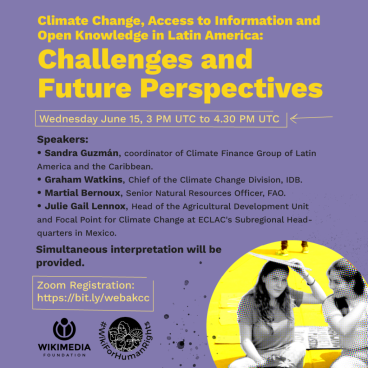By: Evelin Heidel, Wikimedistas de Uruguay & Brisa Ceccon, Wikimedia Foundation
With the global #WikiForHumanRights campaign, Wikimedia organizers have been doing local or regional activities to highlight the importance of open knowledge to tackle the triple planetary crisis of biodiversity loss, pollution and climate change. The connection between human rights and the environment has been vivid in Latin America in recent decades.
Join us for a panel discussion!
To learn more, we invite you to join us on 15 June 2022, from 15 to 16.30 UTC for the panel conversation: “Climate Change, Access to Information and Open Knowledge in Latin America: Challenges and Future Prospects”. Register for the event on Zoom. We will be providing simultaneous interpretation to Portuguese, English and Spanish.
Experts from various international and regional organizations such as the Inter-American Development Bank (IDB), the Food and Agriculture Organization of the United Nations (FAO), the Climate Finance Group for Latin America and the Caribbean (GFLAC), and the United Nations Economic Commission for Latin America and the Caribbean (ECLAC), who play an important role as generators of knowledge and advisors in the design of public policies and investments in climate change in Latin America and the Caribbean, will discuss the following topics:
- What are the main climate change information gaps in the region and their causes?
- What are the impacts of the lack of access to accurate, quality and locally/regionally relevant climate change information in Latin America?
- What actions and partnerships can we undertake to facilitate access to such information? Where should we collectively put the focus?
The expert panelists include:
- Sandra Guzmán, Climate Policy Initiative manager and founder of the GFLAC, the Climate Finance Group of Latin America and the Caribbean.
- Graham Watkins, Chief of the Climate Change Division, IDB.
- Martial Bernoux, Senior Natural Resources Officer, FAO.
- Julie Gail Lennox, Head of the Agricultural Development Unit and Focal Point for Climate Change at UN ECLAC’s Subregional Headquarters in Mexico.

Access to environmental knowledge matters more than ever
One of the main challenges that have inspired our actions in the #WikiForHumanRights campaign this year is that access to knowledge about the climate crisis is not available to everyone. The climate movement has taught us that not everyone is impacted by environmental crises in the same way. Climate change has disparate impacts that worsen already inexisting inequalities, such as race, gender and age inequalities. For that reason, not every region will suffer the same impacts or have the same response or solutions for climate change.
Latin America is home to six out of the 17 megadiverse countries in the world that are under threat from human activities such as deforestation, mining and intensive agriculture. This crisis is compounded by the climate crises. We depend on our ability to have access to information that is locally relevant and culturally appropriate to understand the undergoing changes, adapt better to its impacts, and design creative solutions to these crises.
Wikipedia, the free and multilingual online encyclopedia, is the largest and most-read reference work in history and also one of the 15 most popular websites in the Internet, and the only non-profit site on that list. Therefore, Wikipedia plays an important role in providing access to this information in the main languages spoken in Latin America, including Spanish and Portuguese.
Millions of people access Wikipedia to search for information about climate change in their own language. Last year, around 25 thousand articles on climate change across Wikipedias were viewed 325 million times. Everyone needs access to environmental information in their own language, as recognized in Latin America recently by the Escazú Agreement, in order to make decisions in their everyday lives. Wikipedia can provide that knowledge to all the decision makers in their own language, so that we can work together to solve these compounding crises.
The virtual event will be open to the public and we will be providing simultaneous interpretation into Portuguese, English and Spanish. In order to access the interpretation, you need to register in the Zoom link. The original audio will be streamed through the Wikimedistas de Uruguay YouTube channel. A more detailed agenda is available here.

Can you help us translate this article?
In order for this article to reach as many people as possible we would like your help. Can you translate this article to get the message out?
Start translation